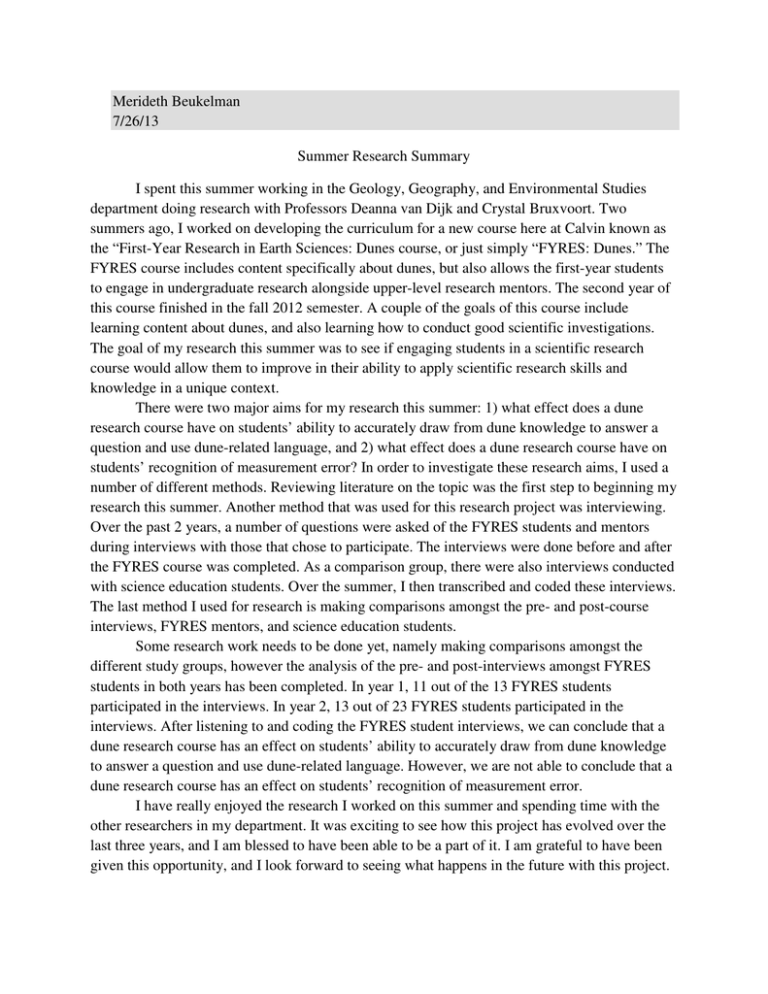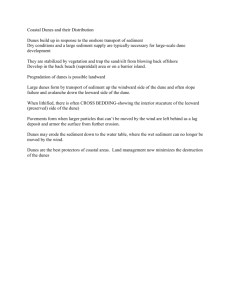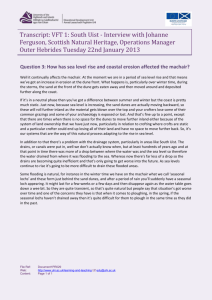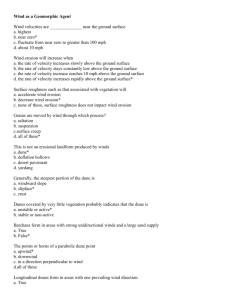Merideth Beukelman 7/26/13 Summer Research Summary
advertisement

Merideth Beukelman 7/26/13 Summer Research Summary I spent this summer working in the Geology, Geography, and Environmental Studies department doing research with Professors Deanna van Dijk and Crystal Bruxvoort. Two summers ago, I worked on developing the curriculum for a new course here at Calvin known as the “First-Year Research in Earth Sciences: Dunes course, or just simply “FYRES: Dunes.” The FYRES course includes content specifically about dunes, but also allows the first-year students to engage in undergraduate research alongside upper-level research mentors. The second year of this course finished in the fall 2012 semester. A couple of the goals of this course include learning content about dunes, and also learning how to conduct good scientific investigations. The goal of my research this summer was to see if engaging students in a scientific research course would allow them to improve in their ability to apply scientific research skills and knowledge in a unique context. There were two major aims for my research this summer: 1) what effect does a dune research course have on students’ ability to accurately draw from dune knowledge to answer a question and use dune-related language, and 2) what effect does a dune research course have on students’ recognition of measurement error? In order to investigate these research aims, I used a number of different methods. Reviewing literature on the topic was the first step to beginning my research this summer. Another method that was used for this research project was interviewing. Over the past 2 years, a number of questions were asked of the FYRES students and mentors during interviews with those that chose to participate. The interviews were done before and after the FYRES course was completed. As a comparison group, there were also interviews conducted with science education students. Over the summer, I then transcribed and coded these interviews. The last method I used for research is making comparisons amongst the pre- and post-course interviews, FYRES mentors, and science education students. Some research work needs to be done yet, namely making comparisons amongst the different study groups, however the analysis of the pre- and post-interviews amongst FYRES students in both years has been completed. In year 1, 11 out of the 13 FYRES students participated in the interviews. In year 2, 13 out of 23 FYRES students participated in the interviews. After listening to and coding the FYRES student interviews, we can conclude that a dune research course has an effect on students’ ability to accurately draw from dune knowledge to answer a question and use dune-related language. However, we are not able to conclude that a dune research course has an effect on students’ recognition of measurement error. I have really enjoyed the research I worked on this summer and spending time with the other researchers in my department. It was exciting to see how this project has evolved over the last three years, and I am blessed to have been able to be a part of it. I am grateful to have been given this opportunity, and I look forward to seeing what happens in the future with this project.



